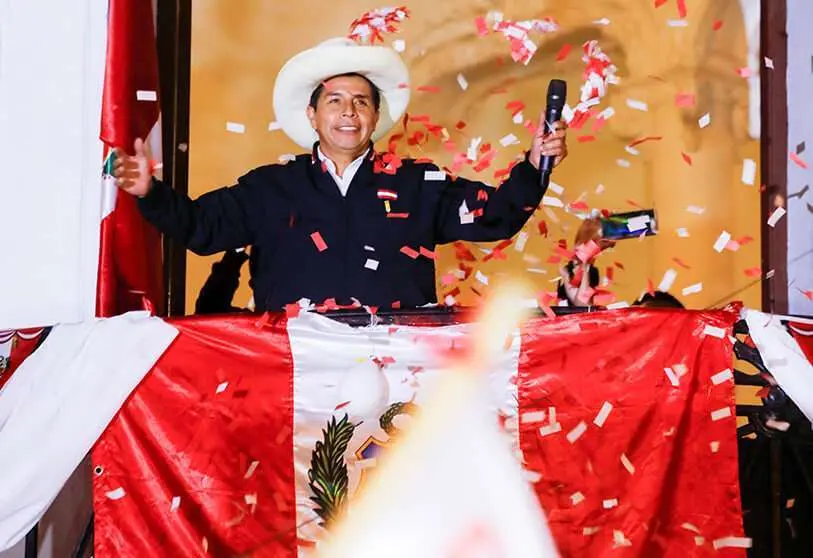Castillo with Cerrón in the background to govern Peru

Coinciding exactly with the 200th anniversary of its independence, Peru enthroned Pedro Castillo, "its first poor president", according to analyst Hugo Otero. He moved directly from his humble rural home in the Andes to the presidential palace in Lima, as he is also the only president in more than a century not to own a house in the capital. A president who declares himself a fervent Catholic, and therefore opposed to abortion, homosexual marriage and euthanasia, has moved to his new residence with his wife Lilia Paredes, a teacher like her husband but an evangelical Christian, and their children: Arnol, 16, and Alondra, 9.
His inauguration ceremony does not clear up the main question of the mandate that President Castillo now begins: will he govern according to his principles and promises or will he be led by Peru Libre's leader, Vladimir Cerrón, the radical leftist politician who shows no compunction in aligning himself with Cuban Castroism and Venezuelan Maduro-Chavism?
During the long wait between the second round of the elections and his proclamation as president-elect, Castillo has made numerous gestures and statements aimed at reassuring both the country's most conservative sectors and foreign investors, including many anxious Spanish companies. Even before appointing the prime minister, Castillo had already appointed the economist and professor Pedro Andrés Francke as minister of Economy and Finance, who has not tired of repeating the same reassuring message: "There will be no expropriations or confiscations of pension plans". Francke will thus be both President Castillo's main supporter and the biggest obstacle to Cerrón's imposing his recognised neo-communist credo on the government.
There are already those who, mutatis mutandis, compare the role that Vladimir Cerrón will play behind Pedro Castillo with the role played by Alberto Fujimori's all-powerful ally, Vladimiro Ilich Lenin Montesinos, both now in high security prisons for corruption and crimes committed under the pretext of combating the bloodthirsty terrorism of the Shining Path. Montesinos has recently been recorded having telephone conversations from prison with civilian and military figures, advising them on how to prevent Castillo from taking the presidential sash, an endeavour in which he has clearly failed.
"We are not Chavistas, we are not communists, no one has come to destabilise this country, we are workers, we are fighters, we are entrepreneurs", Castillo would brag in his interviews prior to his inauguration. At the same time, he repeated like a mantra that health, education and agriculture are the three sectors he intends to prioritise during his mandate, in which he aspires, to begin with, to create at least one million jobs in a year.
In addition, of course, to lessening the ravages of the pandemic, which is particularly deadly in Peru, the next priority is the creation of a constituent commission to draft a new constitution, a political battlefield in which Cerrón aspires to impose a Castro-Chavista-style basic law. Something that, without extra-parliamentary actions - mass demonstrations, general strikes and institutional assaults, for example - is neither easy nor likely to happen, given that the parliament has a large majority of centrist and conservative deputies, and the radical leftists of Perú Libre have only 37 seats out of 130 in the Legislative Chamber.
Castillo, without his own party, found in Cerrón's Perú Libre the political formation capable of providing him with the apparatus with which in the end he won by just 43,000 votes over his rival, Keiko Fujimori. Cerrón, for his part, found in Castillo an ideal figurehead for his aims of integrating Peru into the Castro-Chavist axis. It remains to be seen whether the new president, once vested with institutional power, can impose himself on the designs of the person who facilitated his candidacy and, ultimately, his final electoral triumph. On his struggle with Cerrón will depend not only the direction that Peru will take, but also the direction that the Ibero-American continent may take.

